Somalia makes history by hosting its first ever health research conference in Garowe
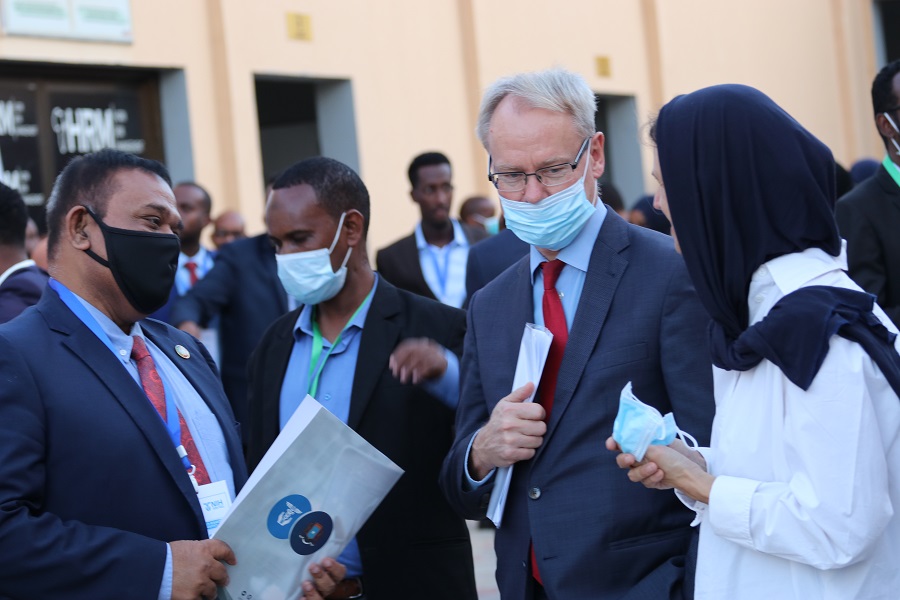 Dr Mamunur Rahman Malik, WHO Representative to Somalia, in discussion with HE Per Lindgarde, Ambassador of Sweden to Somalia. Credit: WHO/Mukhtar
Dr Mamunur Rahman Malik, WHO Representative to Somalia, in discussion with HE Per Lindgarde, Ambassador of Sweden to Somalia. Credit: WHO/Mukhtar
19 February 2022 – The COVID-19 pandemic has accentuated the importance of health research in finding solutions to health challenges. To address the most urgent health priorities using evidence-based solutions, the Ministry of Health and Human Services of the Federal Government of Somalia and National Institute of Health (NIH), with support from the World Health Organization (WHO) and other partners, convened the first ever health research conference in Garowe, Puntland, from 30 January to 1 February 2022.
Some of the brightest Somali minds came together at the event ─ 200 national and international researchers ─ to present 51 unpublished research abstracts, showcasing new evidence and best practices around public health actions in Somalia which were neither researched before in the country by anyone nor had any evidence been generated before on these priority public health issues. Overall, Somali authors submitted 91 abstracts; the rest were either published already or did not meet the expected criteria.
Dignitaries who participated in the conference included: HE Dr Fawziya Abikar Nur, Federal Minister of Health and Human Services; HE Dr Jama Farah Hassan, Minister of Health, Puntland; HE Per Lindgarde, Ambassador of Sweden to Somalia; Dr Mamunur Rahman Malik, WHO Representative to Somalia and Head of Mission. Representatives from the Swedish International Development Cooperation Agency (SIDA), the Public Health Agency of Sweden (PHAS) and African Field Epidemiology Network (AFENET), and colleagues from the University of Umea and the Gothenburg University in Sweden also participated.
Professor Khalif Bile, Chair of the NIH Board of Directors and the Scientific Committee for the NIH Research Conference, spearheaded the event, taking it from an idea to reality. Under the leadership of Dr Abdifatah Diriye Ahmed, NIH Executive Director, the NIH Public Health Specialist and research focal person, Dr Mukhtar Bulale, organized the conference, bringing together all relevant stakeholders.
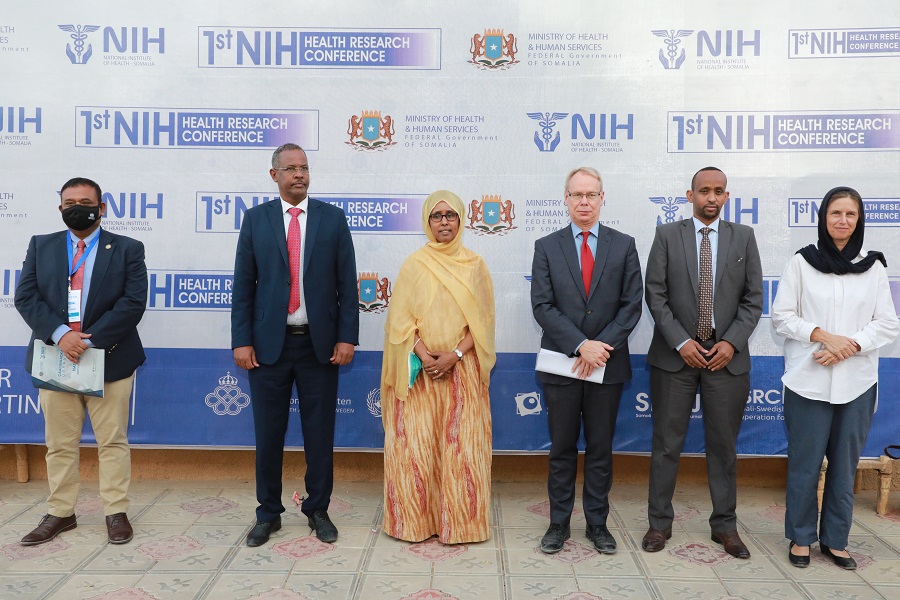 High-level dignitaries, including both the Federal and Puntland's Health Ministers with the WHO Representative, Ambassador of Sweden and NIH Executive Director, attended the research conference. Credit: WHO/Mukhtar
High-level dignitaries, including both the Federal and Puntland's Health Ministers with the WHO Representative, Ambassador of Sweden and NIH Executive Director, attended the research conference. Credit: WHO/Mukhtar
Institutions supporting the NIH
WHO extended financial support to the conference, through the Alliance for Health Policy and System Research (AHPSR), which aims to build health systems research capacity for low and middle-income countries and use new knowledge and evidence from public health research to set policies that support system building. The AHPSR promotes the generation and use of health policy and systems research to improve health systems in low- and middle-income countries, such as Somalia, while developing the research capacity of institutions, systems and individuals.
Other partners of WHO supporting this first ever research conference include the PHAS, which provided financial support to the event, and collaborates with the NIH, in addition to AFENET and SIDA, which offer regular technical support to the NIH’s activities.
Members of academia from 32 public, private and international universities attended the conference, and supported the NIH team at various stages of planning and implementation.
Young, budding Somali researchers light glimmer of hope
Participants at the conference included scientific and technical committees, organizers, presenters, stakeholders, panelists and partners. The scientific committee for the event assessed abstracts, mentored some of the authors whose abstracts needed further refining, and developed guidelines and checklists for peer reviewing the studies.
Of the 51 researchers, seven were female. Additionally, 10 trainees from the first ever Frontline-Field Epidemiology Training Program (FETP-Frontline) conducted in Somalia in 2021, with support from WHO, the PHAS, AFENET and the United States Centers for Disease Control and Prevention (US CDC), offered support to conduct the research conference.
Sadia Hussein, one of the two trainees from the first FETP cohort who presented an abstract, and a WHO Public Health Specialist, explained that she got the idea for her study while she was working in Deynile, Banadir, as part of the FETP field work. She added she enjoyed participating in the conference as it was a forum where researchers and experts came together with policy-makers to display their research skills, while highlighting gaps in the health system, and linking research to the bigger picture in health.
Researchers presented on an extensive range of topics
Researchers presented their findings on six themes that had been selected after taking into consideration the Essential Package of Health Services (Somalia EPHS 2020), universal health coverage (UHC) and Sustainable Development Goals (SDGs). They presented 10 abstracts under the theme of health systems; 15 as part of reproductive, maternal, newborn, child and adolescent health; 18 under communicable diseases; and 8 as part of noncommunicable diseases. Panelists delivered 12 informative presentations related to the themes of health research production and dissemination; and research training and capacity-building, linking research to action.
Presenters stimulated thought-provoking discussions between the sessions, including around strengthening pharmacovigilance and drug regulation; increasing and motivating human resources for health; occupational safety of health workers with the introduction of new diagnostics, improving access to health care for women; and providing compassionate care while maintaining dignity and the privacy of female patients. They discussed how to reduce and eliminate the harmful practice of female genital mutilation (FGM); and recruit assistant community-based midwives to improve maternal health care in rural areas. The only experimental study that was presented focused on ‘Effects of the Coenzyme Q10 on the Peripheral Nerve Injury: An Electrophysiological Study’, presented by a university professor.
Furthermore, participants debated over how to address the high burden of multi-drug resistant tuberculosis in Somalia, and the need to deploy community health workers to enhance early detection of the disease, in order to reach the SDGs’ target of ending tuberculosis epidemics by 2030. These rich discussions aim to spur changes in policies and programming eventually.
Introduction of the first Somali Health Action Journal
As another significant milestone, the NIH Board of Directors launched the Somali Health Action Journal (SHAJ) at the conference. This is the first Somali health journal that will receive articles, facilitate their review by peers, motivate Somalis to conduct further research, write and publish new articles, and take up opportunities to disseminate and use research for policy-making and the design of useful programmes.
The editors of the journal committed to supporting young Somali researchers by mentoring them where possible. The journal aims to inspire the young and future generations of Somali health professionals to study different topics that will lead to innovations in health in the country.
Research must address country’s problems
HE Dr Fawziya Abikar Nur, Minister of Health and Human Services for Somalia, praised the NIH, its board of directors, and scientific committees for motivating several young Somalis to present their findings on crucial health topics.
“I encourage you to document these national efforts ─ both what works and what does not work and why ─ but, above all, provide us solutions that can address the challenges we face,” she said, while thanking the partners who made the event a resounding success.
While lauding the Government of Somalia for its exemplary role in organizing a milestone event of this kind, and commending international researchers for visiting Puntland for the historical gathering and partners such as the PHAS for their support, Dr Mamunur Rahman Malik inspired young and experienced Somali researchers by announcing that WHO will work with the NIH to introduce state-of-the-art libraries in all ministry of health buildings of Somalia. He also added the WHO would award the young researchers nominated by the NIH for the best research presented in future conferences.
Dr Malik reminded the audience that in 1990, it was noted that only 10% of global health research was allocated for addressing 90% of global health problems. A commission set up to address this problem warned that if this disparity was not changed, the world would experience a large burden of infectious diseases, increasing rates of tuberculosis, malaria, and epidemics of noncommunicable diseases including heart diseases. As predicted, Dr Malik explained, the world is now seeing a high burden of these diseases, including infectious and noncommunicable diseases.
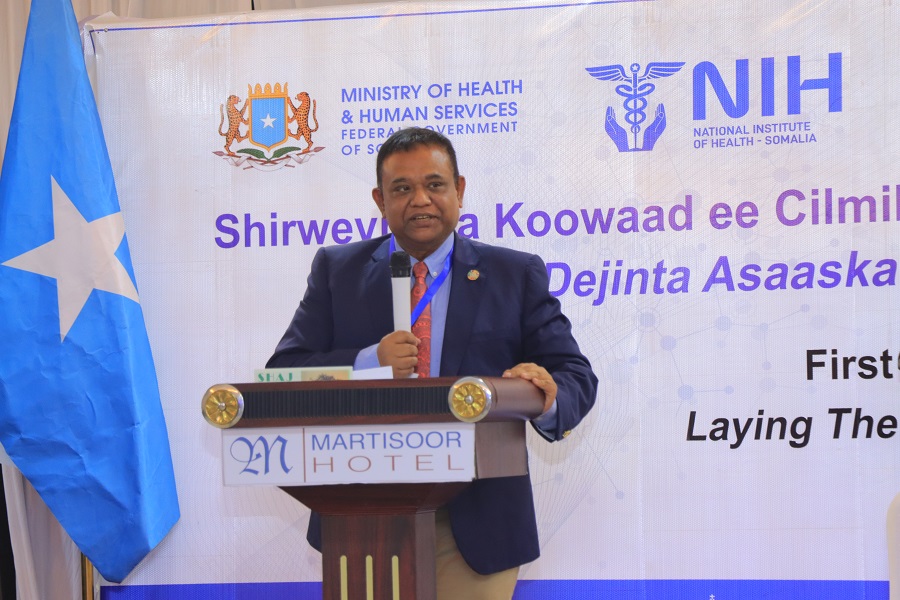 Dr Mamunur Rahman Malik, WHO Representative to Somalia addresses the researchers and participants at the research conference. Credit: WHO/Mukhtar
Dr Mamunur Rahman Malik, WHO Representative to Somalia addresses the researchers and participants at the research conference. Credit: WHO/Mukhtar
“I encourage you to come up with a national health research agenda and improve collaboration between the public and private sector, especially universities,” said Dr Mamunur Malik. “Also, research needs to contribute to improving national health. For example, diarrhoea and malaria contribute to a high burden of diseases but people do not have access to health services. Research should help address issues like this, and how to improve access in fragile settings like in Somalia, address health inequities, and increase access to drugs so people lead healthier lives.”
Putting Somalia on the global research map
On behalf of the NIH team, Dr Mukhtar Bulale explained that the sessions were successful and led to rich discussions with questions being answered, which was a flagship symbol illustrating useful nationally owned health research.
“Even though we started small, this conference has put Somalia on the global research map. Seeing young researchers put their best foot forward has given us immense hope that Somalia’s health research development is undergoing a recovery phase. We saw at the conference a unity of purpose, solidarity and eagerness for research partnerships and solutions to challenges. I urge stakeholders to ensure we do not miss the opportunity to support these young, dynamic researchers,” Dr Bulale said.
At the end of the conference, the Federal Ministry of Health, NIH, and stakeholders advocated for sustained investment in health research to further promote the Essential Package of Health Services 2020, which would benefit the Somali population. They also resolved to promote health system research, linking it to public policy formulation, while ensuring it focuses on addressing existing barriers to health service delivery. This implies the development of a national research agenda to invest – attention, resources and skills – in research that will result in improved health outcomes for the populations, and thematic areas where more evidence is required to inform policies and strategies. Together, they also committed to foster cooperation between the public and private sector in health system research, and to promote the development of innovative technologies and approaches. The partners resolved to strengthen the links between evidence generation and health care provision, while calling on all national and international stakeholders to develop the capacity of learning institutions and to facilitate high-quality research in the country.
Note to editors
The World Health Organization (WHO) country office for Somalia, the Government of Sweden and the Public Health Agency of Sweden (PHAS) are providing support to Somalia’s Federal Ministry of Health and Human Services (FMOH) to support the establishment and strengthening the capacity of the National Institute of Health (NIH) of Somalia. Please below articles for additional information on this exemplary collaboration.
- Somalia rolls out FETP-Frontline training programme to build disease detectives/baare and prevent spread of diseases
25 October 2021 - Somalia pioneers implementation of an integrated disease surveillance and response strategy in a fragile setting
18 October 2021 - WHO Somalia - Policy-brief 5 - Integrated Disease Surveillance and Response Strategy for Somalia (IDSRS): improving surveillance and response capacity or national health security in Somalia
October 2021 - WHO Somalia - Policy-brief 4 - Shaping national health security in Somalia through field epidemiology training programmes
October 2021 - WHO and Sweden sign agreement to further strengthen the capacity of the National Institute of Health and improve digitalization of health information in Somalia
28 June 2021 - WHO and SPIDER Center sign agreement to strengthen health information management in Somalia
8 March 2021 - An innovative and unique partnership: WHO, Sweden and Somalia work together to improve health outcomes for all Somalis
1 February 2021 - WHO and Public Health Agency of Sweden sign MoU to support establishment of National Institute of Health for Somalia
5 January 2021
Additional information on the Alliance for Health Policy and System Research
Forgotten diseases: Achieving health equity to end the neglect of poverty-related diseases in Somalia
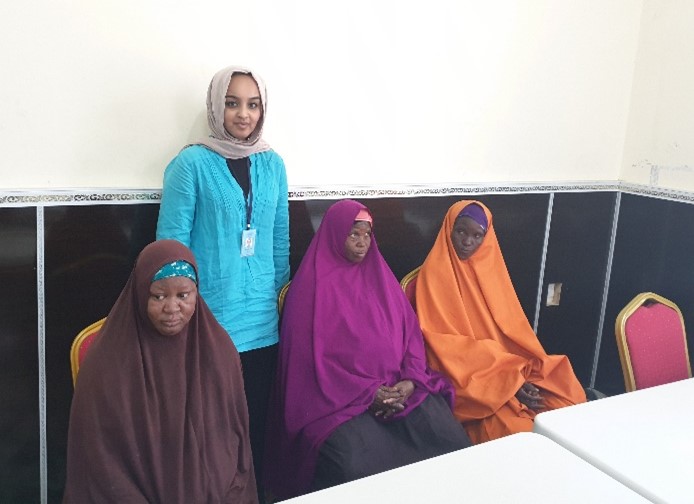 A technical officer from the WHO Regional Office for the Eastern Mediterranean, Dr Mona Osman, after a discussion with patients. Credit: WHO30 January 2022 – In May 2021, the World Health Assembly resolved to dedicate 30 January each year as World Neglected Tropical Diseases Day to shed light on the public health challenge that neglected tropical diseases (NTDs) pose in countries such as Somalia. This came about as a result of lobbying from the United Arab Emirates to galvanize support for communities suffering without enough support, particularly as other disease control initiatives gain more attention. This year, the theme for World Neglected Tropical Diseases Day is ‘Achieving health equity to end the neglect of poverty-related diseases.’
A technical officer from the WHO Regional Office for the Eastern Mediterranean, Dr Mona Osman, after a discussion with patients. Credit: WHO30 January 2022 – In May 2021, the World Health Assembly resolved to dedicate 30 January each year as World Neglected Tropical Diseases Day to shed light on the public health challenge that neglected tropical diseases (NTDs) pose in countries such as Somalia. This came about as a result of lobbying from the United Arab Emirates to galvanize support for communities suffering without enough support, particularly as other disease control initiatives gain more attention. This year, the theme for World Neglected Tropical Diseases Day is ‘Achieving health equity to end the neglect of poverty-related diseases.’
Prevalence of NTDs in Somalia
NTDs are known to be ‘neglected’ owing to the lack of attention they receive, including from the donor community, policy-makers and stakeholders. The NTDs in Somalia are a consequence and cause of poverty as they thrive where access to clean water, sanitation and health care is limited. They affect the poorest, most marginalized communities, particularly children, women and the elderly, and those who lack access to basic needs like clean water. In Somalia, they impact communities living in rural and remote settings and the outskirts of big towns. These diseases cause immeasurable suffering, and prevent adults from being able to work and children from being able to go to school.
Of the 20 NTDs listed by WHO as endemic in tropical countries, the most prevalent in Somalia are: leprosy, schistosomiasis, soil-transmitted helminthiases and visceral leishmaniasis. About 5 to 6 million people in the country live in areas that are highly endemic for these NTDs. On the occasion of World Neglected Tropical Disease Day, WHO and its partners renew their call to address the health inequity that is the main driver for people suffering from NTDs to access quality health care and as a result, these ancient diseases continue to thrive and impact health and productivity.
Somalia a global priority for leprosy control
In 2019, as Somalia was one of 16 countries reporting more than 1000 new cases of leprosy, the WHO Global Leprosy programme classified it as a global priority country. Even before this though, the Federal Ministry of Health and Human Services had been working to respond to this disease. In August 2015, the Ministry of Health established an NTD section, after which the detection of new leprosy patients improved, and increased from 107 in 2015 to 2638 in 2021, despite a global drop in cases reported and detected in 2020 due to the spread of the coronavirus disease 2019 (COVID-19). The overall increase in detection of new leprosy cases in Somalia is also linked to support received from the Nippon Foundation, which has been supporting Somalia for the last several years to conduct outreach and raise awareness around leprosy, enhance screening of patients, and support leprosy patients with treatment so they are non-infectious.
Lack of awareness leads to social exclusion
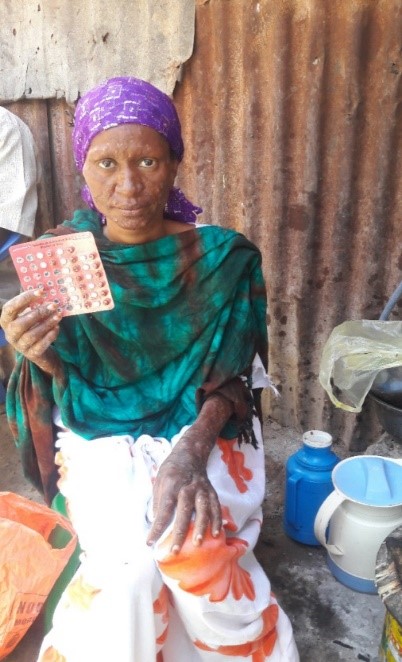 Culimo shares her experiences of living with leprosy, also known as Hansen’s disease Credit: Ali Abdi IsackAt the age of 19, Culimo Osmal Hilowle contracted leprosy – a disease that she didn’t know much about – despite having no memory of how she got infected. Even though she didn’t have any physical disability, she started to present with sores on her skin.
Culimo shares her experiences of living with leprosy, also known as Hansen’s disease Credit: Ali Abdi IsackAt the age of 19, Culimo Osmal Hilowle contracted leprosy – a disease that she didn’t know much about – despite having no memory of how she got infected. Even though she didn’t have any physical disability, she started to present with sores on her skin.
“Everyone I know was afraid I would spread this disease to them,” Culimo says. “They isolated me. At some point I even started to believe that I had a mental disability, but once I started to receive treatment, I knew I couldn’t infect anyone and felt much better as I integrated into the society again.”
Culimo owns a small shop where she sells vegetables every day, to support her 2 boys alongside her husband.
Leprosy can be treated, cured and stopped if it is detected in good time. “It would be good for more people to learn about forgotten diseases like leprosy. Now that people around me know more about the disease, they treat me well and support me.”
Additional resources needed to fight NTDs and increase health equity
Besides leprosy, it is estimated that 9 of the most endemic regions for NTDS in Somalia are also affected by visceral leishmaniasis. For several years, there have only been 3 main treatment centres, situated in two regions of Bakool and Bay and supported by WHO with capacity-building and medicines, that provide services to support patients suffering from visceral leishmaniasis. Most patients who come in with this disease are from rural areas, where they may have limited access to health services. Even though the local communities in these locations, in collaboration with international and local nongovernmental organizations, provide support to address visceral leishmaniasis, there is a need to have additional capacity to address NTDs like this.
In 2016, a study noted that most schistosomiasis and soil-transmitted helminth cases were found in the regions in the South West state of Somalia. In response, from 2017 to 2020, WHO supported the Ministry of Health to offer medicines using mass drug administration activities. In 2020, WHO and the Ministry of Health offered medication to around 2 909 457 school-aged children and adults to protect them schistosomiasis and soil-transmitted helminth infections.
Taking measures to address NTDs
WHO Somalia is supporting the Ministry of Health to reduce the prevalence of NTDs, by offering technical support, mobilizing resources, including medical drugs, and increasing coordination between donors and the Federal Government of Somalia to fight NTDs. Key donors supporting the fight against NTDs include the Nippon Foundation, the Government of Japan, and The END Fund, alongside support from the WHO Regional Office for the Eastern Mediterranean.
“In a two-pronged approach, WHO is supporting the Government to respond to NTDs, while also working to ensure all Somalis have equitable access to health services through universal health coverage,” said Dr Mamunur Rahman Malik, WHO Representative to Somalia and Head of Mission. “In the very near future, WHO and the Government aim to develop the national strategy for elimination and control of NTDs, running from 2022 to 2025, which will increase the capacity of institutions to prevent and respond to NTDs and support patients in a holistic manner, no matter where they live. Our Country Cooperation Strategy 2021–2025 aims to ensure a healthy future for every Somali by accelerating the uptake and coverage mass drug administration through improving access to care which remains the main intervention for control of NTDs. However, we will need more support from policy-makers, donors and stakeholders to make this a reality.”
NTDs are strongly linked to universal health coverage (Target 3 of the Sustainable Development Goals). The WHO country office renews its pledge and promises on leaving no one behind. Providing access to health services and essential medicines for NTDs is an indicator of the overall success of universal health coverage.
WHO Country Cooperation Strategy 2021–2025 for Somalia signs off. Partners hail it as a landmark event
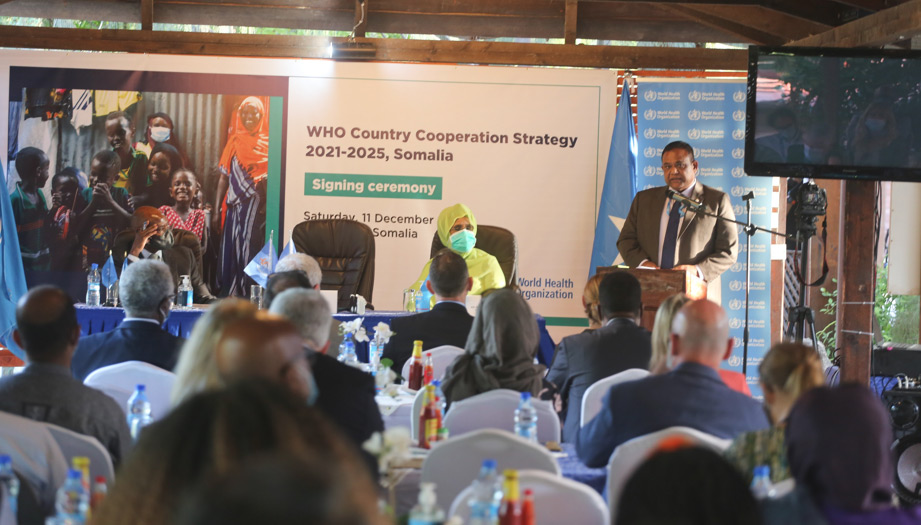
At a signing ceremony held in Mogadishu on 11 December 2021, on the eve of Universal Health Coverage Day, the World Health Organization (WHO) country office for Somalia launched its five-year Country Cooperation Strategy (CCS), 2021–2025, for Somalia, which will guide its health programme over the next five years in line with national development priorities. Dr Mamunur Rahman Malik, WHO Representative to Somalia and Head of Mission, presided over the event and signed the strategy which was co-signed by HE Dr Fawziya Abikar Nur, Minister of Health and Human Services of the Federal Government of Somalia, and Mr Adam Abdelmoula, Deputy Special Representative of the Secretary General (DSRSG) and United Nations Resident and Humanitarian Coordinator for Somalia.
The Ambassadors of Italy and the United Kingdom, and other Heads of Mission and senior officials from the European Union Delegation and United States of America and were amongst the dignitaries who attended this milestone event. Senior representatives and heads of United Nations agencies in Somalia, including the Food and Agricultural Organization (FAO), International Organization for Migration (IOM), United Nations Children’s Fund (UNICEF), United Nations Development Programme (UNDP), United Nations High Commissioner for Refugees (UNHCR), United Nations Office for the Coordination of Humanitarian Affairs (UNOCHA) and United Nations Office on Drugs and Crime (UNODC) also attended the ceremony.
While describing the mutual trust and spirit of collaboration that Somalia’s Federal Ministry of Health and WHO share, Dr Fawziya Abikar Nur said, “The Somali Federal Government has embarked on the implementation of a transformative agenda aimed at rebuilding its health system to achieve universal health coverage and improve health security. In line with their mandate, our trusted partner WHO is helping us strengthen our public health functions and our stewardship role to advance the health and well-being of the Somali people. The WHO’s Country Cooperation Strategy has been launched at the right time to help our country provide the right technical leadership and stewardship to achieve our vision of Health For All.
One of the first WHO country offices to launch its CCS since the onset of the COVID-19 pandemic
As one of the first few WHO country offices across the world to launch its CCS since the onset of the pandemic, WHO is demonstrating its commitment to supporting the health system of one of the most fragile and vulnerable countries in the world to recover from one of the worst national and global public health crises of our lifetimes. The CCS for 2021–2025 aims to support and rebuild the health system of Somalia to be more resilient, inclusive and responsive, so that everyone, everywhere, in the country can access quality health care services without any financial hardships. The timing of launch of the CCS, its strong focus on rebuilding the health system and the boldness shown by the country office in launching the strategy during the pandemic have been hailed by all partners and donors as a landmark achievement by WHO.
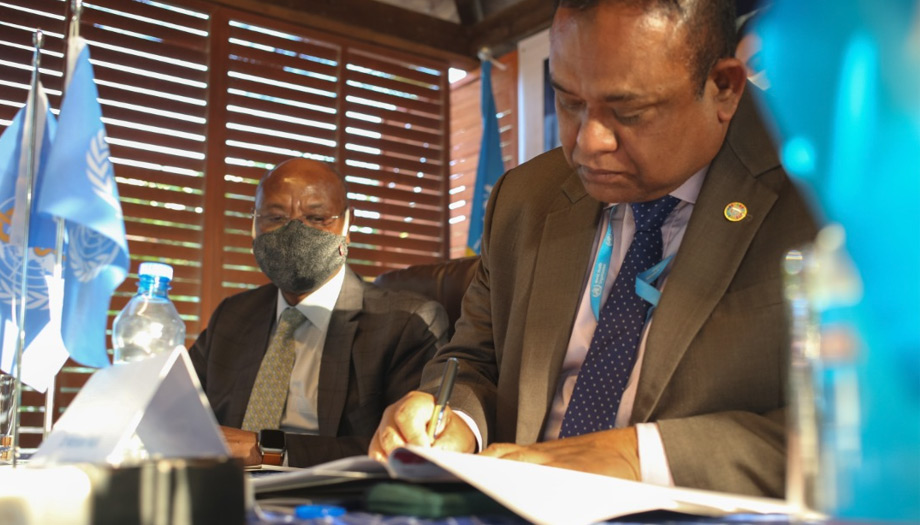
“We chose to launch this strategy and do other normative functions. Not because this has been easy, but because this was challenging, and because this will showcase our intent, our Organization’s vision and our goals when the country needs us the most. This strategy will test our energies and skills and measure the impact that we create,” Dr Mamunur Malik said at the CCS launch event.
Aligned with Somalia’s national health and development goals, the CCS is a tool to implement the WHO’s Thirteenth General Programme of Work 2019–2023 (GPW 13) that aims to drive progress in health at the country level, in unison with ministries of health.
Acknowledging that the CCS complements the United Nations Sustainable Development Cooperation Framework (UNSDCF), Mr Adam Abdelmoula, reiterated the support of United Nations agencies for both WHO and the Federal Ministry of Health to ensure that good-quality, accessible and equitable health services are available to improve the health of all Somalis.
Supporting Somalis towards a healthier, more productive future
WHO Somalia’s CCS, which algins with GPW 13, aims to “support Somalis to a healthier, productive future” and rests on four main strategic priorities: advancing universal health coverage (UHC) through primary health care to support the goals of integrated health services; enhancing health security by strengthening emergency preparedness, surveillance and response; promoting healthier populations and well-being by addressing the social determinants of health; and strengthening health governance using the Global Action Plan for Health and Well-being for All (GAP) to support joint and collective actions to achieve the health-related Sustainable Development Goals (SDGs).
The CCS will support the government to advance its agenda of attaining UHC, so that more people will have equitable access to essential health services without having to suffer financial hardship – Somalia’s UHC index is currently just 25 out of 100, as compared to the global average of 68 out of 100 in 2019.
The CCS will help to better ensure that initiatives undertaken will improve the lives of Somali populations of all ages and backgrounds, no matter where they live across the country. The overall improvements in access to health will have profound effects on economic growth and productivity, as well as on peace and development.
Serving Somalis of all ages no matter where they live
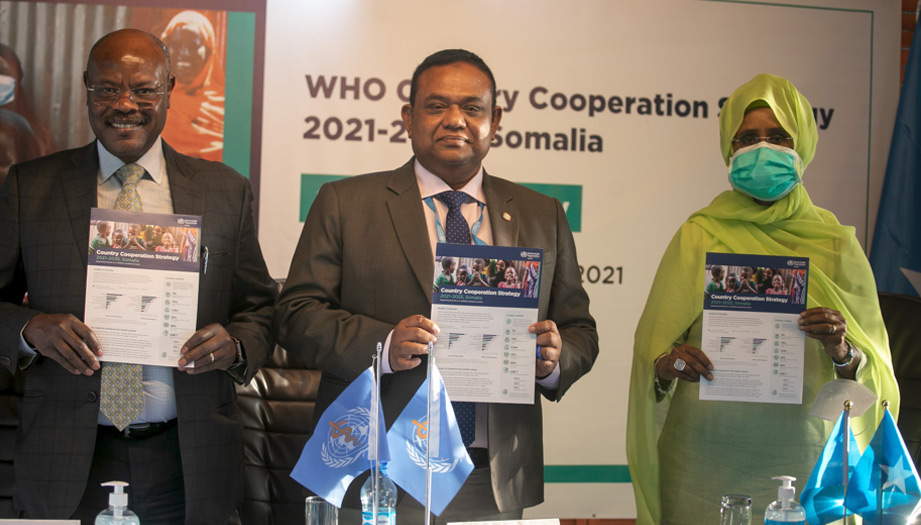
T
To serve children – Somalia future leaders – the CCS will scale up childhood immunization coverage in the country. By spending US$ 7 per child, the CCS will aim to fully vaccinate all vulnerable children against all routine diseases targeted as part of the expanded programme on immunization (EPI). By delivering vaccines at household level, Somalia will be able to forge a reliable contact point between families and essential and life-saving primary health care service providers.
For mothers, community midwives will provide simple, but effective, evidence-based means for reducing infant mortality, including breastfeeding and “kangaroo” mother care, as well as encouraging both antenatal and postnatal care.
Investment in community health workers, 80% of whom are women, will ensure that Somalia reaps the benefits in health, economic growth and gender equality. Meanwhile, investments in community health workers will help close the gap in access to health services between different subpopulations and boost economic returns due to the greater productivity of a healthier population.
While focusing on three of the top 10 causes of deaths and disabilities in Somalia – noncommunicable diseases, injuries and mental health – the CCS will also invest in health and nutrition, and combatting communicable diseases. In addition, the strategy aims to steer progress in reducing the current carbon footprint of the health sector and the negative health effects of fuels used in Somalia. Furthermore, the CCS will aim to deliver on its promise, in line with its global mandate, to use sustainable, cost-effective, high-impact innovations to save lives.
WHO will continue to strengthen its existing partnerships and forge new ones, to make the right and timely investments in institutions, systems and the health workforce to ensure that the health services offered respond to everyone’s needs, values and preferences.
WHO’s report on establishing emergency, critical and operative care services in a fragile setting while capitalizing on the COVID-19 response in Somalia officially launched
14 December 2021 – On 9 December 2021, the World Health Organization (WHO) country office for Somalia officially launched a report entitled ‘Capitalizing on the COVID-19 response: towards establishing emergency, critical and operative care services in a fragile setting.’ Led by the WHO Representative to Somalia, Dr Mamunur Malik, this official launch was attended by other dignitaries, including: the Federal Minister of Health and Human Services of Somalia HE Dr Fawziya Abikar Nur; the Deputy Special Representative of the Secretary-General and United Nations Resident and Humanitarian Coordinator for Somalia Mr Adam Abdelmoula; and the World Bank Country Manager for Somalia Ms Kristina Svensson. The launch was followed by a webinar to stimulate rich discussions around opportunities to build a stronger and resilient health system in Somalia, through the lens of emergency, critical and operative care services in a fragile setting.
High-level participants engage in stimulating discussions
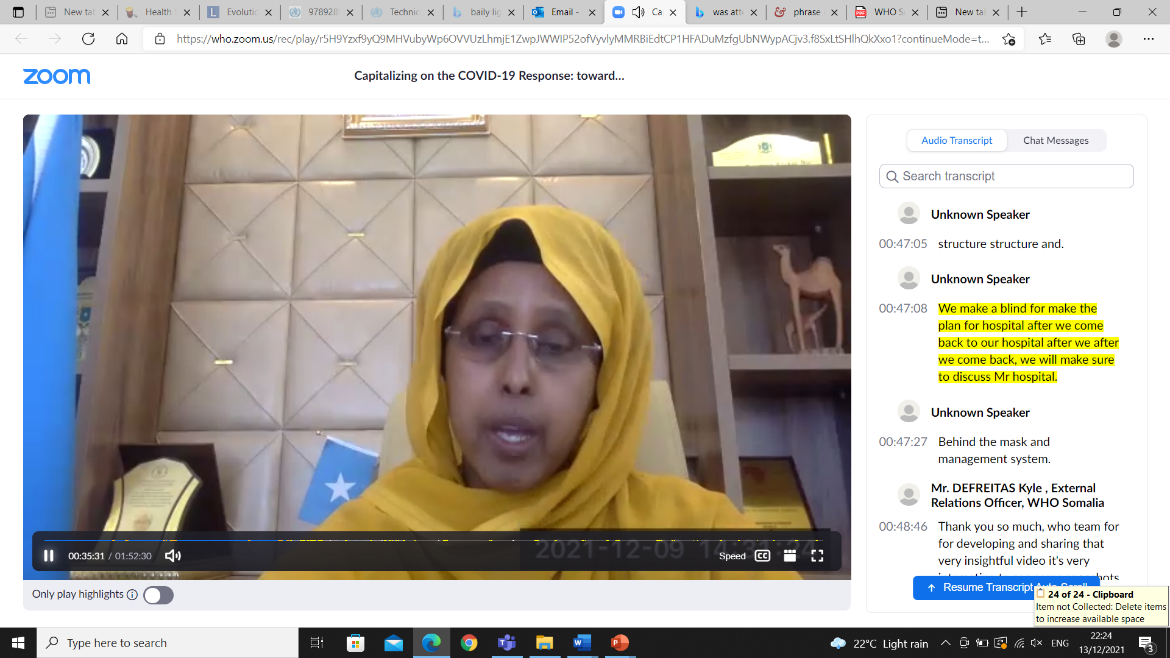 HE Dr Fawziya Abikar Nur, the Federal Health Minister explained how the activities conducted for COVID-19 would build and strengthen a resilient health system in the countryThe high-level participants delivered opening remarks to set the tone and stage for the webinar. During her opening remarks, HE Dr Fawziya Abikar Nur said, “One of the important lessons that we all learned during the COVID-19 pandemic is that it is imperative to invest in all components and levels of health system, not only on primary level care alone. Through the support received from the World Bank and WHO, a series of activities were implemented to improve access of Somalis to good quality emergency and critical care services. The outcomes of these activities will help build sustainable emergency care services for all medical and surgical conditions.”
HE Dr Fawziya Abikar Nur, the Federal Health Minister explained how the activities conducted for COVID-19 would build and strengthen a resilient health system in the countryThe high-level participants delivered opening remarks to set the tone and stage for the webinar. During her opening remarks, HE Dr Fawziya Abikar Nur said, “One of the important lessons that we all learned during the COVID-19 pandemic is that it is imperative to invest in all components and levels of health system, not only on primary level care alone. Through the support received from the World Bank and WHO, a series of activities were implemented to improve access of Somalis to good quality emergency and critical care services. The outcomes of these activities will help build sustainable emergency care services for all medical and surgical conditions.”
She added that a hospital assessment conducted as part of these activities will offer evidence for informed decision-making, as stakeholders will better understand the emergency, critical and operative care services situation in the country, in efforts to build a long-term strategy to strengthen emergency care services and integrate them into primary and secondary levels of care, while advancing towards universal health coverage (UHC).
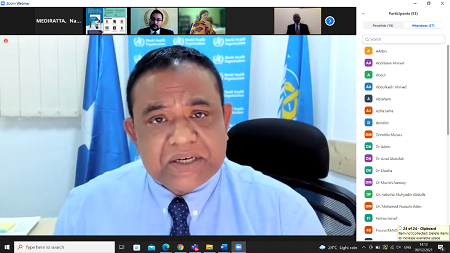 Dr Mamunur Rahman Malik, WHO Representative and Head of Mission to Somalia, explained the need for critical care in Somalia drawing evidence from recent studies The WHO Representative and Head of Mission to Somalia, Dr Mamunur Malik, reiterated a key lesson learnt from the COVID-19 response in Somalia, saying, “Patients receiving simple medical oxygen were up to 5 times more likely to survive than those who were on a ventilator. This shows the dire need for critical care support and services in all settings, including fragile ones. These services need to be affordable, sustainable, delivered within the ‘golden hour’, aligned with national health priorities, and rapidly implementable to a large scale to reduce preventable deaths and suffering.”
Dr Mamunur Rahman Malik, WHO Representative and Head of Mission to Somalia, explained the need for critical care in Somalia drawing evidence from recent studies The WHO Representative and Head of Mission to Somalia, Dr Mamunur Malik, reiterated a key lesson learnt from the COVID-19 response in Somalia, saying, “Patients receiving simple medical oxygen were up to 5 times more likely to survive than those who were on a ventilator. This shows the dire need for critical care support and services in all settings, including fragile ones. These services need to be affordable, sustainable, delivered within the ‘golden hour’, aligned with national health priorities, and rapidly implementable to a large scale to reduce preventable deaths and suffering.”
While reaffirming the United Nations’ support to the Somali health system and WHO in their endeavours, Mr Abdelmoula, Deputy Special Representative of the Secretary-General and United Nations Resident and Humanitarian Coordinator for Somalia, emphasized the importance of emergency care in Somalia.
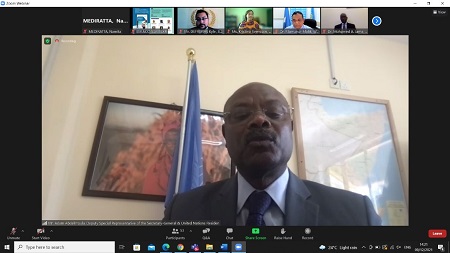 Mr Adam Abdelmoula, Deputy Special Representative of the Secretary-General and United Nations Resident and Humanitarian Coordinator stressed how the COVID-19 pandemic has shown the importance of critical care services He said that, “The COVID-19 pandemic has revealed that emergency care is critical to the achievement of UHC. Emergency care serves as a safety net and last resort for people with life-threatening health conditions who cannot be treated at the primary care level.”
Mr Adam Abdelmoula, Deputy Special Representative of the Secretary-General and United Nations Resident and Humanitarian Coordinator stressed how the COVID-19 pandemic has shown the importance of critical care services He said that, “The COVID-19 pandemic has revealed that emergency care is critical to the achievement of UHC. Emergency care serves as a safety net and last resort for people with life-threatening health conditions who cannot be treated at the primary care level.”
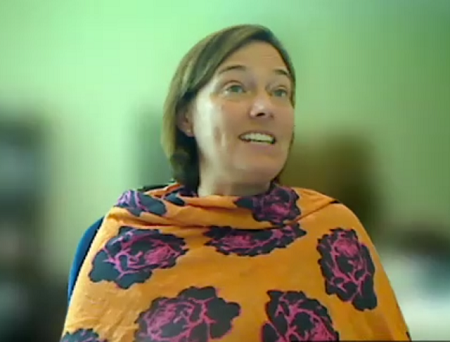 Ms. Kristina Svensson, the World Bank Country Manager for Somalia reiterated the World Bank’s support to Somalia“We are happy to see that the support from the World Bank’s Pandemic Emergency Financing Facility went towards the capacity-building of frontline workers, which we all have learnt in hindsight is one of the best tools to fight the pandemic. This is only the start of our support to Somalia,” said Ms Svensson, the World Bank’s Country Manager for Somalia. While describing the World Bank’s crisis recovery efforts, Ms Svensson also called on donors and agencies active in the health care sector to work on improved coordination under the leadership of the Government.
Ms. Kristina Svensson, the World Bank Country Manager for Somalia reiterated the World Bank’s support to Somalia“We are happy to see that the support from the World Bank’s Pandemic Emergency Financing Facility went towards the capacity-building of frontline workers, which we all have learnt in hindsight is one of the best tools to fight the pandemic. This is only the start of our support to Somalia,” said Ms Svensson, the World Bank’s Country Manager for Somalia. While describing the World Bank’s crisis recovery efforts, Ms Svensson also called on donors and agencies active in the health care sector to work on improved coordination under the leadership of the Government.
Panel session on developing and sustaining emergency, critical and operative care services in Somalia
Following the official launch of the report by Dr Mamunur Malik and handing over the report to HE Dr Fawziya Nur and Ms Svensson, the WHO’s Head of Unit for Clinical Services and Systems, Dr Teri Reynolds, explained to the audience how emergency, critical and operative care links with a health system’s goals, UHC, and the essential packages of health services, which countries such as Somalia will be rolling out soon to better ensure health for all.
Dr Mohamed Abdi Jama, Senior Policy Advisor to the Ministry of Health, Federal Government of Somalia, then led a panel discussion on developing and sustaining emergency, critical and operative care services in Somalia, with a view to achieving UHC. He engaged the panelists to hear more about their experiences and lessons learned, discussing future opportunities with regard to sustainable capacity- and institution-building in emergency, critical and operative care services.
Experts on the panel included: Mr Ibrahim Mohamed Nur, Senior Health Management Information Systems and Health System Specialist, Federal Ministry of Health of Somalia; Dr Ibrahim Hussein Ali, Emergency Medical Coordinator, Federal Ministry of Health of Somalia; Dr Bernard Olayo, Senior Health Specialist, World Bank; Dr Sara Halimah, Regional Trauma Specialist, WHO Regional Office for the Eastern Mediterranean; Dr Pryanka Relan, Technical Officer, WHO; and Dr Zainab Abdirahman Ali, a trainee and medical doctor at the Galkayo Hospital. Each shared invaluable experiences and insights with respect to their engagement and support under this project, as well as what the project has meant for improved health services across the country.
Paving the way to offer robust emergency, critical and operative care
Through these institution- and capacity-building interventions, and inclusive discussions, assessments and analysis, Somalia’s Federal Government, WHO, the World Bank and other key partners have already started to lay the foundation for robust, good quality and affordable emergency, critical and operative care that all Somalis will be able to access, both now and in the near future.


